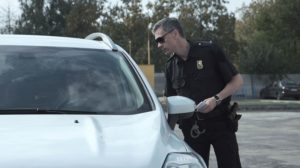The process of a police stop for suspicion of DUI (driving under the influence) in Texas is a well-defined procedure that law enforcement officers must follow. This process is implemented to ensure that an individual’s civil rights are not violated and that the arrest is based on probable cause.
Steps Police Should Consider Or Take For DUI Suspicion
Police officers play a crucial role in detecting and preventing drunk driving. They do this by patrolling the roads, responding to calls from the public, and setting up checkpoints. Here’s how it works.
Pulling You Over


Police officers are not allowed to pull a driver over solely to check for drunk driving without a reasonable suspicion that the driver is intoxicated. This is based on the 4th Amendment to the United States Constitution, which protects individuals from unreasonable searches and seizures by the government.
Reasonable suspicion is defined as specific, articulable facts that, together with objective and reasonable inferences, would lead a reasonable officer to believe that a crime has been committed or is about to be committed. This can include observations of the driver’s behavior, such as swerving or running a stop sign or the smell of alcohol on their breath.
Another reason an officer might pull you over is when it’s required during that particular season. The police are also on legal grounds to check your status during DUI checkpoints. These are legal in some states, especially in Texas, but not all. DUI checkpoints are a type of roadblock where police officers stop all or a portion of drivers passing through a specific area to check for signs of impairment. However, they must meet certain conditions to be constitutional, such as the location and time of the checkpoint must be chosen based on neutral criteria and not on individualized suspicion.
If someone has been pulled over for another traffic violation, police may also screen them for DUI. For example, you may be arrested for DUI after being pulled over for speeding.
Making Personal Contact
Traffic violations or erratic driving can give police officers a reason to pull a driver over. However, these behaviors can also be caused by factors other than drunk driving, such as fatigue, distractions, or mechanical problems with the vehicle. Only by executing this prior observation can they have an initial idea that you’re a drunk driver. To conduct a DWI (driving while intoxicated) investigation, police officers must have sufficient evidence to believe that the driver is under the influence of alcohol or drugs.
During a traffic stop, an officer may ask the driver to perform tests, such as walking in a straight line or reciting the alphabet, to check for signs of impairment. They may also ask the driver to take a breathalyzer test to measure their blood alcohol content (BAC). However, it is essential to note that drivers are not required to submit to these tests, and refusing to do so cannot be used against you in court.
Take note that there are multiple defenses to DWI charges. For example, bloodshot eyes and slurred speech can be caused by factors other than alcohol consumption, such as allergies or lack of sleep. You are not required to provide explanations or excuses to the police officers.
Additionally, if an officer sees alcohol containers or drug paraphernalia in the car or smells alcohol on the driver’s breath, they may begin a DWI investigation. However, it is said that having an open beer can in the cup holder or having the smell of alcohol on your breath is not conclusive evidence of drunk driving and does not necessarily mean that you will be charged with a DWI.
It is important to remember that if you are pulled over, you have rights and should exercise them. It is always wise to consult with a DUI attorney if you have been charged with a DUI.
The Pre-Arrest Screening
The pre-arrest screening is the process that a police officer goes through to determine if a driver is under the influence of alcohol or drugs. If the officer suspects the driver is under the influence, they may ask the driver to perform field sobriety tests (FSTs) tests to check for signs of impairment. Common FSTs include the horizontal gaze nystagmus test, the walk-and-turn test, and the one-leg-stand test. These tests measure the driver’s balance, coordination, and ability to follow instructions.
- Horizontal Gaze Nystagmus (HGN) Test: The officer observes the driver’s eyes as they follow a moving object, looking for involuntary jerking, which is more pronounced when someone is under the influence.
- Walk-and-Turn Test: The driver is asked to walk heel-to-toe in a straight line for a set distance, then turn around and walk back.
- One-leg Stand Test: This test involves the driver standing on one leg and counting while maintaining their balance.
It is important to note that these tests can be tricky and easy to fail, especially if the driver has balance or coordination problems. Additionally, drivers have the right to refuse these tests, and refusing to take them cannot be used against them in court. However, if a driver refuses a field sobriety test, the police may mandate a blood or urine test to check for drugs or alcohol in their system.
Note that during all this commotion, the police dashboard camera almost always records both video and audio, and anything the driver says to the officer at that time is considered public record.
Further Testing
Field sobriety tests alone are not always enough to guarantee a conviction for a DUI or DWI (driving while intoxicated) charge. That is why police officers often ask drivers to take a breathalyzer test, which measures the amount of alcohol in a driver’s breath and provides a more accurate measurement of the driver’s blood alcohol content (BAC).
Unfortunately, portable breathalyzers are unreliable sometimes, and a negative result could lead to police demanding a blood test. As you know, the breathalyzer test only measures the amount of alcohol in a person’s breath, not their blood. If the police believe that a driver is impaired and the breathalyzer test shows low or no alcohol, they may move on to blood tests to check for drugs.
In Texas, if a driver refuses to take a chemical test, such as a breathalyzer, they can face a suspension of their driver’s license for up to six months. This is possible because of Texas’ DWI implied consent laws, which state that drivers are considered to have given their consent to chemical testing if they are arrested for a DWI by driving on the state’s roads. If a driver has had at least one drug or alcohol arrest in the past ten years, the suspension could last as long as two years.
However, it is essential to note that the driver’s license suspension is separate from the DWI charge, and a driver can hire an attorney to challenge the suspension of their driver’s license after a DUI arrest. Consult a DUI attorney who can advise you on your rights and the best way to defend yourself against the charges.
Booking
If the officer finds that the driver is above the legal limit or their behavior and performance on the tests indicate impaired, the officer will likely arrest them for DUI (driving under the influence). The driver will then be taken to the police station for booking – where the officer will record the driver’s personal information, such as their name, address, and date of birth. The officer will also take the driver’s license and issue a temporary driving permit that allows the driver to get home but not much else.
At the police station, the driver will be photographed, fingerprinted, and may be searched. The driver will also be advised of their rights, such as the right to remain silent, the right to an attorney, and the right to be informed of the charges against them.
After the booking process is complete, the driver may be held in jail until they can be bailed out or until a judge releases them on their own recognizance. The release can be done by posting bail, or if the judge finds the driver is not a flight risk or danger to society, they can be released on their recognizance without bail.
It is important to note that the booking process and the time spent in jail can vary depending on the arrest’s circumstances and a judge’s availability. It is always wise to consult with a DUI attorney from The Medlin Law Firm if you have been arrested for DUI.
Why Hire A DUI Attorney From The Medlin Law Firm?
A Medlin Law Firm DUI attorney will thoroughly understand the laws and procedures related to DUI cases in Texas. They will be familiar with the state’s implied consent laws, which require drivers to submit to chemical testing if they are arrested for DUI, as well as the penalties for refusing to take a test. They will also be familiar with the state’s blood alcohol content (BAC) limit for commercial drivers and the penalties for driving above it. Additionally, they will have experience with the criminal justice system in Texas, including court procedures and plea bargaining. The Medlin Law Firm has fought for multiple cases before and can help you to build a strong defense against the charges against you.
(682) 204-4066 We cannot receive pictures via text so please send those via email or hand deliver to our office.
(682) 204-4066 No podemos recibir imágenes por mensaje de texto, así que envíelas por correo electrónico o entréguelas personalmente en nuestra oficina.






